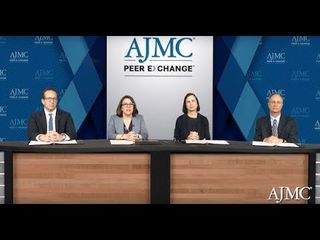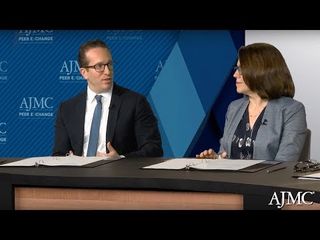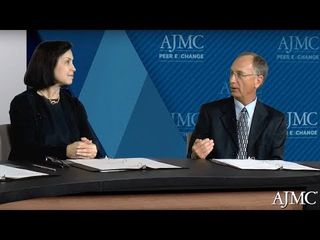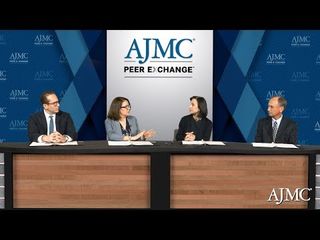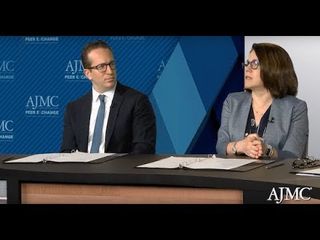
Clinical
Latest News
Latest Videos

More News

A new clinical study to reduce the unwanted side effects of radiation in patients with human papillomavirus (HPV)—positive oropharynx cancers has found that reducing the dose of radiation can maintain the cure rates but avoid some of the late treatment-associated toxicities.

What we're reading, December 28, 2016: a county in West Virginia is suing 3 national drug distributors for allegedly fueling the opioid epidemic; CDC awards new funding as another Zika case is reported in Texas; and first drug to treat spinal muscular atrophy approved.

FDA’s regulatory science activities are working to advance the field of precision oncology, in part by using predictive analyses to identify patients that may be good candidates for certain therapies, according to Sean Khozin, MD, MPH, senior medical officer at the FDA.

The Lancet study shows addition of bortezomib significantly improves survival in treatment-naïve patients with multiple myeloma.

Using angiogenesis inhibitors in patients with glioblastoma that is highly vascularized could yield much improved outcomes, the analysis found.

A new study has found that women chose not to go ahead with contralateral prophylactic mastectomy (CPM) if their surgeon recommended against it.

Adolescents who have “adult-type” cancers should be enrolled in relevant clinical trials to improve access for this population of patients, experts from the FDA write in a recently published perspective.

What we're reading, December 22, 2016: Americans continue to sign up for Obamacare coverage despite Republicans' promise to repeal the law; California is implementing a $3 billion effort to help the state’s neediest individuals; and Zika vaccine shows success.

Researchers at the Moffitt Cancer Center have developed a genomics model called genomic-adjusted radiation dose that can guide the radiation dose to match a tumor’s radiosensitivity.

There is a need in rheumatoid arthritis to be able to individualize treatments, but without credible and reliable biomarkers, it just isn't possible yet, said Allan Gibofsky, MD, professor of medicine and public health at Weill Cornell Medical College and an attending rheumatologist at Hospital for Special Surgery.

Along with the peer-review research, journal articles, and news coverage, The American Journal of Managed Careâ„¢ (AJMCâ„¢) has a robust multimedia component that brings together stakeholders from across the healthcare industry to discuss important topics in the world of managed care and delve deeper into topics.

The FDA has provided accelerated approval for rupacarib along with the first next-generation sequencing—based companion diagnostic test, for the treatment of women with advanced ovarian cancer.

Here's a look at some of the most popular articles published in Evidence-Based Oncologyâ„¢ in 2016.

This week, the top stories in managed care include President Barack Obama signing the 21st Century Cures Act into law, findings from the CDC that opioid abuse has reduced life expectancy for Americans, and CVS announced a new program to lower costs for patients with diabetes.

At the Community Oncology Alliance (COA) Payer Exchange Summit V, panelists provided insights for successful implementation of payment models in oncology clinics.

What we're reading, December 15, 2016: Democrats won't help repeal the Affordable Care Act, but some may help pass a replacement; drug makers push new opioids despite lack of evidence they reduce overdoses; CDC issues Zika virus travel advisory for Texas town.

The guideline recommends that cancer patients should receive palliative care early and in parallel with their active treatment plan.

Paxman is seeking approval for using its scalp cooling device as an intervention to prevent chemotherapy-induced alopecia (CIA) in women undergoing chemotherapy treatment for breast cancer.

What we're reading, December 13, 2016: 1 in 6 American adults are prescribed psychiatric drugs; veterans groups want Donald Trump to keep the current Veterans Affairs secretary; and the number of drug-affected newborns is rising more in rural areas.

A study published in the Journal of Clinical Oncology has found that step therapy can be cost-effective in patients with cancer who are under psychological duress.

An exhaustive study conducted by researchers at the Kaiser Permanente Division of Research has found that a woman’s social network can significantly affect her chances of survival following breast cancer.

Palliative care is an underutilized and powerful resource in the drive towards value. In the current article, we review published evidence and highlight how Medicare Advantage plans, accountable care organizations, and oncology practices can benefit from concurrent palliative care under value-based payments.

The United States is in the midst of an opioid epidemic that has been responsible for a 200% increase in deaths due to overdose of heroin or an opioid pain reliever since 2000. Guidelines provide clinicians with ways to identify patients at risk of opioid use disorder and best practices of prescribing opioids.

By using telemedicine and relocating the center of care to where a person lives, we have an opportunity to address more unmet demand for palliative care, while giving more control to the seriously ill to meet their stated needs.

This week, the top stories in managed care included poll results that show growing numbers of Republicans want the Affordable Care Act scaled back instead of repealed, Jardiance received a new indication for patients with type 2 diabetes, and CareMore reported care coordination gaps for seniors.

